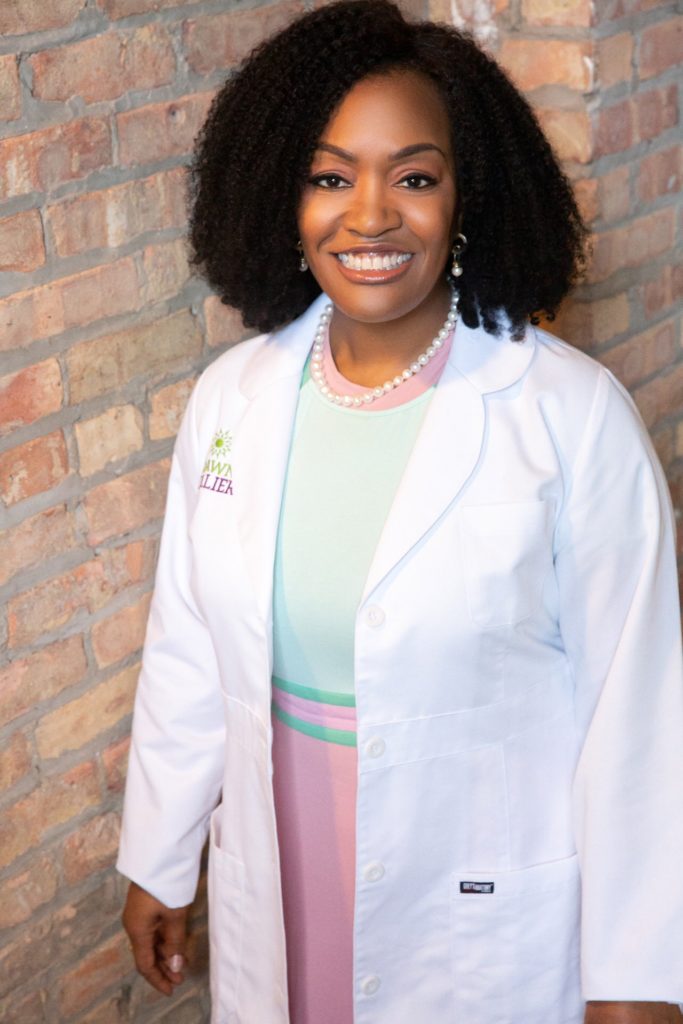Greetings! It is Dr. Dawne, Chicago’s own Board-certified Ob/Gyn. My mission is to empower girls and women of all ages with pertinent medical knowledge and proactive reproductive health information that will optimize your physical AND mental health. We celebrated National Physicians Day a few weeks ago. It was time to appreciate the commitment, hard work, and dedication physicians have in improving the health and well-being of those in their communities. It was especially meaningful to me, a Black woman physician.
I take pride in the fact that as a Black woman physician, I am part of a special group (2% to be exact) that does not look like a “traditional doctor. I automatically introduce myself as Dr. Collier when walking into a patient room. If not, I may be mistaken for the nurse, or other support staff, rather than the physician. While I would love to attribute it to my youthful appearance, I know that it is due to the implicit bias many people have towards Black women in the medical field. At this point, I am weary of the racism and sexism rampant in medicine. I work to overcome it by keeping my mission in mind, which is to improve the health and well-being of those I serve.
Despite all of this, I use my experiences with racism and sexism to enhance me as a physician. Here are 4 methods I employ to improve the relationship between me and my patient. Hopefully, you will find these qualities in your physician as well.
LISTEN TO MY PATIENTS
First, I spend time truly listening to my patients, not writing, or typing on my computer. As a Black woman physician, I am a member of a group of people that is regularly dismissed and overlooked. Because of that, I value really listening to what my patients share with me. That means paying attention to the issues my patients feel are important. That also means making sure those issues are addressed. This ultimately fosters my patient’s trust in the health plans we’ve made.
ASK QUESTIONS
Second, I ask questions to clarify what my patients have shared. Repeating their answers back to them helps me understand their concerns. When my patients are speaking, I try to not interrupt. This ensures that their complete thought process is given and understood.
OFFER EMPATHY AND CONCERN
Third, I offer empathy, and concern, to my patients about their problems, medical and non-medical. My patient’s home-life greatly impacts their medical care. For instance, I’ve had many pregnant patients who were admitted to the hospital for significant obstetric care, leave against medical advice. Most times this is due to childcare issues. Adopting my prescribed medial plans to my patient’s specific needs, is what I do to optimize their care.
TREAT PATIENTS WITH CARE & RESPECT
Finally, I speak to my patients with respect and reverence. Being a Black woman physician means I’ve sometimes been addressed with disrespect and disdain. I am determined not to perpetuate that behavior, because I know how hurtful those microaggressions can be. A preachy condescending tone will not work, if I truly want my patient to trust a given medical plan. Talking to my patients about what’s happening to them without using overly wordy medical terms, helps ensure they truly understand. I cannot tell you the number of times I’ve seen my patient’s eyes glaze over from excessively technical explanations. When discussing a medical condition, I use common life occurrences as an example of what is medically happening to them. Most are appreciative of this approach.
FINAL THOUGHTS
Thru the years (18 in fact!) these methods have helped me foster an warm and open dialogue with my patients, so I am able to have my patients actively involved in the medical decision-making process. I realize that ultimately, I can only advise, and not force patients to agree to the medical care I am offering. With a thorough understanding of their specific health process; together, patients and I can create a unique path to their better and improved health. This is my goal, and ultimately why I do what I do.
For more information and blogs like this, visit my website at DrDawneobgyn.com and follow me on Facebook, Instagram and Twitter at DrDawneObGyn.

And Remember, #MelaninInMedicineMatters #WomenInMedicineMatter #KnowMoreBeBetter
Dr. Dawne Collier-Dupart is a board-certified obstetrician gynecologist, women’s health educator, 2X best-selling author, and speaker. Dr. Dawne resides in Chicago with her husband, Olufemi Dupart and chocolate lab, Apollo “Apologetic” Creed. For information about puberty and the menstrual cycle, how girls can overcome poor body image and develop more self confidence, read her book “The Clever Girl Life: A Teen Guide to Positive Body Image, Self-Confidence, and Life Happiness”, you can find it here.


